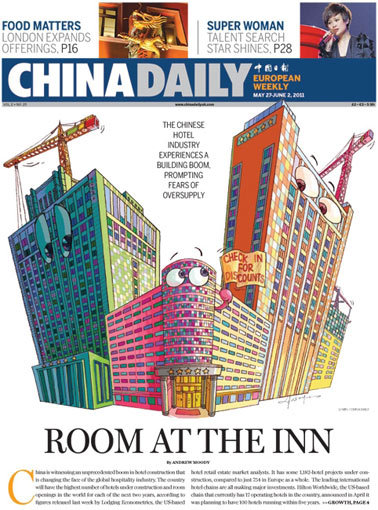Sector has a shortage of qualified employees
Updated: 2011-05-27 10:40
By Stephen Rice (China Daily European Weekly)
I was here in Beijing when the city was preparing for the 2008 Olympics. As a trainer I could deeply appreciate the daunting task of getting ready for the flood of foreigners that would be coming to China.
Those that were here will remember the mass numbers of selected volunteers eagerly practising their English and learning to be courteous and helpful through formal training, the required English lessons for taxi drivers and the concerted effort to correct all English signage. There were even small cartoon booklets distributed to the public showing what behaviors were acceptable and how to be good citizens.
But these preparations could be seen as minor when one considers what the Olympics meant for the hotel and hospitality industry and the preparations it would need to undertake. In retrospect, this monumental event more clearly revealed a problem that, unless solved, will only grow.
China has a serious shortage of talent in the hotel and hospitality industry.
Here at Antal International, a global recruitment agency, I often hear the phrase, "It's a candidate-driven market." While this is currently true of most sectors, it is particularly pertinent in the hospitality sector where, for many reasons, good talent is hard to find and often even more difficult to keep.
It's not a lack of laborers that plagues the industry, however, but rather a lack of trained and qualified talent. When a new hotel opens, often hordes of unskilled workers apply and are given low-level jobs.
Applicants are normally 20-years-old or younger, with only a middle school level education and no prior work history. They fill positions such as maids, working in the front office and in the banquet room.
Predictably, staff turnover among the young people is very high, so a hotel has to constantly train new people.
One problem is that recent college graduates are not willing to work their way up the career ladder. Low-paying, entry-level jobs often requires long hours for five to 10 years. Well-trained employees often feel discouraged and move on to different industries.
Some with graduate degrees but no real experience expect to start in a management position and are unwilling to take the time to gain the necessary experience and perspective to become a well-rounded manager.
Also, there is still a stigma when it comes to working in the service industry here in China, where parents discourage their sons and daughters from taking a job at a hotel. This way of thinking is deeply rooted in cultural perspective and is difficult to change in a place that traditionally values the concept of "face".
Another problem in the hotel industry is that it is very difficult for Chinese staff members to be promoted to executive management positions. Most general managers or directors are from Hong Kong, Europe, the United States, Singapore, Malaysia, etc.
The leadership at most international hotels feel that the local Chinese talent lacks professional knowledge of hospitality, management experience and professional service spirit.
One reason for this is that the hospitality industry in China is not as developed as Europe or Southeast Asian countries, which have very mature tourism and hospitality industries. The education of hospitality in Chinese universities or professional schools is not very scientific or as well-respected as foreign programs.
Retention of good talent is proving to be more and more difficult as the industry experiences this critical shortage yet simultaneous rapid growth. Hotels have to increase salaries and offer more competitive packages to attract and keep skilled personnel or lower their expectations. This situation is amplified in second- and third-tier cities as hotels are even more challenged to bring talented and skilled hospitality workers from bigger cities.
More hotels have also realized the importance of training. They are utilizing some of the leading international hospitality consulting and training companies. These training providers can design specialized training courses upon request and arrange internal cross-department training to develop more all-encompassing talent. Many hotels also have their own training centers and schools, such as the hotel chain Shangri-La, which has regular training courses for each department.
While it may be true that during the past 10 years more people have gone abroad to study hospitality and returned to China with higher qualifications, it will take time for this to make a significant impact on the immediate shortage.
Perhaps more Chinese people can be encouraged to study in professional hospitality schools both in China and abroad and the old stigmas can make way for new ideas about the value of those working in the service industry.
For those who enjoy working with people and are willing to get the experience that puts training into practice, the hotel and hospitality industry looks to have a strong and promising future.
The author is China training manager of Antal International, a global executive recruitment agency.
E-paper

Thawing out
After a deep freeze in sales during the recession, China’s air conditioner makers are bouncing back
Preview of the coming issue
Cool Iron lady
Of good and evil
Specials

Memory lanes
Shanghai’s historic ALLEYS not just unique architecture but a way of life

Great expectations
Hong Kong-born singer songwriter rises to the top of the UK pops.

A diplomat of character
Belgian envoy draws on personal fascination to help build China ties.
